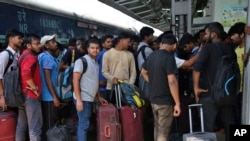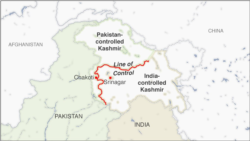Tensions have soared along the volatile, highly militarized frontier between India and Pakistan in the disputed Himalayan region of Kashmir, as India deployed more troops and ordered thousands of visitors out of the region.
Indian firing Sunday along the Line of Control that separates Kashmir between the rivals wounded a woman as the ongoing skirmishes spread fear in border villages, Pakistani police said. The frontier residents on the Pakistani side are either moving out to safer places or have begun construction of new bunkers, with some strengthening existing shelters near their homes.
Pakistan and India, who both claim Kashmir in its entirety, routinely blame each other for initiating border skirmishes, but the latest ones come amid the Indian government's evacuation order of tourists and Hindu pilgrims and a troop buildup in its part of the region.
The measures have sparked fears in Kashmir that New Delhi is planning to scrap an Indian constitutional provision that forbids Indians from outside the region from buying land in the Muslim-majority territory. In recent days, Hindu-majority India has deployed at least 10,000 troops in Kashmir, with media reports of a further 25,000 ordered to one of the world's most militarized regions.
In Pakistan's portion of Kashmir, Mohammad Fareed, a retired government employee in Tufrabad village near the Line of Control, said he had spent over $3,000 to construct a concrete bunker for his family of 10. ``It looks like the situation is getting bad,'' he said, adding that the recent shelling and the dropping of cluster bombs had created massive fear.
"People are using their savings to build bunkers. After all, if you live you will do other things," said Fareed.
Mohammad Altaf, a trader dealing in construction material, confirmed that people were buying concrete blocks and crushed stone to construct bunkers in and around their homes.
But Mohammad Nasim opted to shift his family from Chakoti village to a safer place. "God knows what will happen the next day so it's not wise to make a bunker. Instead I am moving away from the border area," he said.
Raja Farooq Haider, the prime minister of Pakistani-controlled Kashmir, announced Friday the sanctioning of about $19 million for community bunkers for residents living along the border.
Kashmir has grabbed the spotlight in recent days, months after a deadly militant attack on an Indian paramilitary convoy sparked cross-border air attacks and brought India and Pakistan to the brink of war. The recent escalation has come amid offers by President Donald Trump to mediate to resolve the Kashmir issue. While Pakistan welcomed the offer, India rejected it, saying the dispute was between the two countries.
Amid the evacuation order, hundreds of Indian and foreign visitors, including some Hindu pilgrims, continued congregating outside the main terminal at the airport in Srinagar, the region's main city, seeking seats on flights out.
The Indian air force flew 326 tourists out of Srinagar, the Press Trust of India news agency reported. Out of 11,301 tourists, only 1,652 remained on Saturday, PTI said.
Tourists and pilgrims also took buses out of the region, with authorities busing out hundreds of Indian students from Srinagar colleges.
The order on Friday cited the "prevailing security situation" and the "latest intelligence inputs of terror threats with specific targeting" of the annual Hindu pilgrimage as reasons for the advisory. Several governments issued similar travel advisories.
Kashmiri politicians and ordinary residents fear the government measures are a prelude to doing away with Kashmir's special status and intensifying an ongoing crackdown against anti-India dissenters. Kashmir, a region known for lush green valleys, lakes, meadows and dense forested mountains, has become notorious for security lockdowns and crackdowns.
In its election manifesto earlier this year, Prime Minister Narendra Modi's Hindu nationalist Bharatiya Janata Party promised to do away with special rights for Kashmiris under India's constitution.
Rumors continued swirling in the region on Sunday, ranging from the disarming of Kashmiri police forces, to the Indian military taking over local police installations, to a sweeping military crackdown being planned ahead of India's independence day on Aug. 15.
"India is getting cornered at the geostrategic level as America seeks Pakistani help for withdrawing from Afghanistan," said Fayaz Ahmed, a political science teacher in Srinagar. "In turn, India is mounting pressure on Pakistan by building up tensions in Kashmir though militaristic approaches inside Kashmir as well as along the frontier."
Meanwhile, Pakistan late Saturday accused India of using banned cluster munitions to target the civilian population, killing two people. The Indian army rejected the claim, saying Indian soldiers killed at least five attackers while foiling an attempt by gunmen from Pakistan's side of Kashmir to target an Indian post.
Rebels in Indian-controlled Kashmir have been fighting Indian control since 1989. Most Kashmiris support the rebels' demand that the territory be united either under Pakistani rule or as an independent country, while also participating in civilian street protests against Indian control. About 70,000 people have been killed in the uprising and the ensuing Indian crackdown.
Mughal reported from Muzaffarabad, Pakistan. Associated Press writer Zarar Khan in Islamabad contributed to this report.
AP-WF-08-04-19 1058GMT





